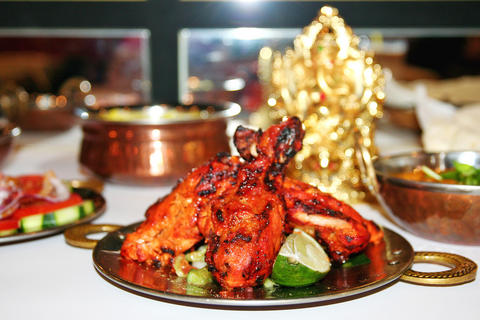It's not an inventive name for a restaurant but Calcutta Indian Food does what it says well. The brother-sister owners are Taiwanese from the West Bengal city and opened the restaurant in Ximending a couple of months ago. Hou Yong-tian (侯勇添) used to be the chef at Spice Shop in Tianmu, so the kitchen has pedigree.
Foreigners, including Indians, form a large portion of the pair's clientele, but locals are being lured in by competitively priced set meals in the week. These range from NT$190 for the vegetarian curry and NT$280 for the lamb, including a salad, soup or drink, nan bread or rice.
Most of the Indian subcontinent's better-known dishes are listed on the menu ("hot and spicy vindaloo," bhuna and madras) but the spicy hot lamb curry mass kolhapuri (a Marathi dish) was a surprise and there is an emphasis on creamy flavors such as pasanda and murgi malai. Side dishes are plentiful and the fiery laccha, a "Delhi-spice salad" is worth trying. Rice is saffron colored and there is a selection of nan breads.

PHOTO: JULES QUARTLY, TAIPEI TIMES
I've visited five or six times and the food has always been of a good standard. It is North Indian in character, according to the owners, tending toward stronger flavors. An example of this was the chicken tandoori, bright orange and baked until it was ever-so-slightly charred. The chicken was good quality and far removed in taste from some of the fake tandooris served up in this city.
Other highlights of previous meals included the iced Darjeeling tea, lemon soda, daal soup and a refreshing homemade milk rice dessert called firni. The channa masala, a chickpea dish with a sweetness balanced by a firm but fair chili kick, come recommended. The raita yogurt is a favorite with many Taiwanese, we were informed, and teased the taste buds. The worst crime as far as Indian food is concerned, is being boring.
The decor will be familiar to lovers of Indian food around the world: Colonial-period, patterned wallpaper in a deep ochre red, a mini chandelier, a few brass fittings and a couple of India-themed pictures. In addition to the usual "fortune cat" (招財貓) waving his paw at the cash desk there is a brass statue of Ganesh the elephant god. Service is informal and friendly.

Taiwan has next to no political engagement in Myanmar, either with the ruling military junta nor the dozens of armed groups who’ve in the last five years taken over around two-thirds of the nation’s territory in a sprawling, patchwork civil war. But early last month, the leader of one relatively minor Burmese revolutionary faction, General Nerdah Bomya, who is also an alleged war criminal, made a low key visit to Taipei, where he met with a member of President William Lai’s (賴清德) staff, a retired Taiwanese military official and several academics. “I feel like Taiwan is a good example of

March 2 to March 8 Gunfire rang out along the shore of the frontline island of Lieyu (烈嶼) on a foggy afternoon on March 7, 1987. By the time it was over, about 20 unarmed Vietnamese refugees — men, women, elderly and children — were dead. They were hastily buried, followed by decades of silence. Months later, opposition politicians and journalists tried to uncover what had happened, but conflicting accounts only deepened the confusion. One version suggested that government troops had mistakenly killed their own operatives attempting to return home from Vietnam. The military maintained that the

Before the last section of the round-the-island railway was electrified, one old blue train still chugged back and forth between Pingtung County’s Fangliao (枋寮) and Taitung (台東) stations once a day. It was so slow, was so hot (it had no air conditioning) and covered such a short distance, that the low fare still failed to attract many riders. This relic of the past was finally retired when the South Link Line was fully electrified on Dec. 23, 2020. A wave of nostalgia surrounded the termination of the Ordinary Train service, as these train carriages had been in use for decades

Lori Sepich smoked for years and sometimes skipped taking her blood pressure medicine. But she never thought she’d have a heart attack. The possibility “just wasn’t registering with me,” said the 64-year-old from Memphis, Tennessee, who suffered two of them 13 years apart. She’s far from alone. More than 60 million women in the US live with cardiovascular disease, which includes heart disease as well as stroke, heart failure and atrial fibrillation. And despite the myth that heart attacks mostly strike men, women are vulnerable too. Overall in the US, 1 in 5 women dies of cardiovascular disease each year, 37,000 of them